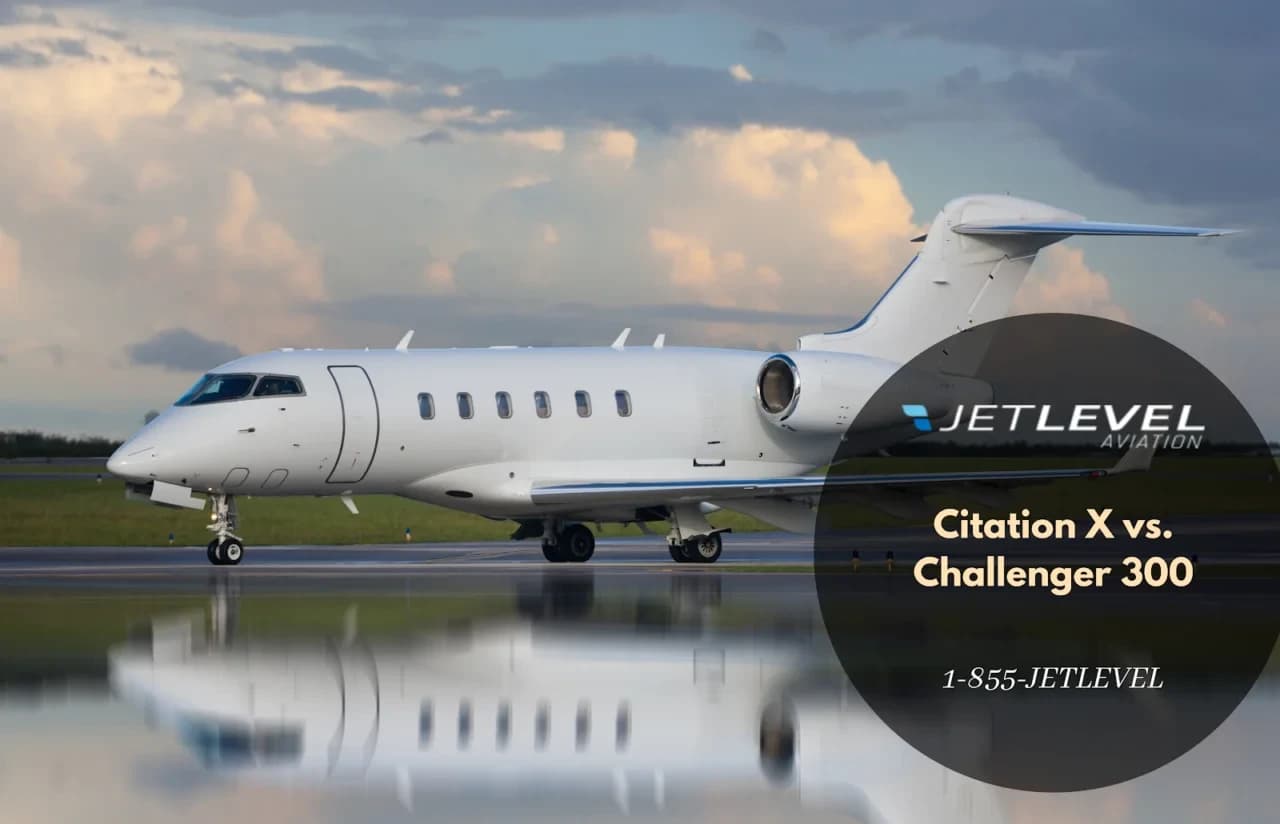
Whether you’re looking at ownership, membership, or simply to charter a private jet, you may be interested in knowing the specs of the jet that you’ll be traveling in. The Citation X and the Challenger 300 are both super midsize private jets with comparable characteristics, but here are some important things to know about these aircraft before you make a decision. First of all, what is a super midsize jet? Super midsize aircraft are aircraft that will seat 8 or 9 passengers comfortably and can fly coast to coast without requiring a fuel stop.
Cessna Citation X
The Cessna Citation X is an American super midsize jet that was first introduced in 1993 and has been in production ever since. There is an upgraded Citation X+ with a stretched cabin and a few more upgrades. The Citation X is the first Cessna to use a Rolls-Royce engine and integrated avionics. It has a number of innovative features, notably the large diameter of the engine intakes which reduces noise from the engines and improves fuel efficiency. It also has a highly swept wing which increases its top speed.
BEST SUPER MIDSIZE PRIVATE JETS FOR COAST-TO-COAST FLIGHT
For coast-to-coast flights, both jets offer compelling features: the Citation X, with its exceptional speed, reduces flight time significantly, while the Challenger 300 provides a balance of speed, range, and cabin comfort, making both jets excellent choices for long-haul travel.
The Citation X+
The Cessna Citation X+, introduced in 2012, has an upgraded cabin and a major boost in avionics, including three 14 inch screens and a heads-up display (HUD). Because of increased fuel consumption and increased thrust, the Citation X+ has a higher cruising speed and a longer range. Of the Citation X and X+ aircraft in operation, by continent North America has the largest percentage at 89% followed by Europe (5%), accounting for a combined total of 94% of the world’s fleet. (avbuyer.com)
Bombardier Challenger 300
The Challenger 300 is a private super midsize jet that has been in production since 2004. It’s special features include supercritical wings which reduce cruise lift-induced drag by 17%. It climbs quickly, and is very fuel efficient even at high speeds. It has state-of-the-art Rockwell Collins Pro Line 21 avionics.
Cruise Speed
The Citation X has a cruising speed of 528 kn (978 km/h). The Challenger 300 has a cruising speed of 459 kn (850 km/h). So, in this category, the Citation X has the edge. In fact, the Citation X is the second fastest midsize private jet, second only to the Citation X+. Although the difference in speed may not be significant in a short flight along the eastern seaboard, for example, a cross-country or transatlantic flight is where the Citation X really shows off its speed. (The Citation X+ has a cruising speed of 536 kn, or 993 km/h).
CITATION X+ UPGRADES AND AVIONICS REVIEW
The Citation X+ brings notable upgrades over its predecessor, including enhanced avionics, a more spacious interior, and improved efficiency, making it an even more appealing choice for those prioritizing speed and performance in their travel.
Altitude Range
The Citation X has a considerable range of 3,460 nmi, or 6,410 km, which puts it in the range to easily leave New York City and reach Dublin, London, or Barcelona. The Challenger 300 has a shorter range, at 3,100 nmi, or 5,751 km. This puts a New York to Dublin trip at about the limits of the Challenger. (The Citation X+ has an additional range of approximately 190 kn or 352 km.)
Aircraft Cabin
While the Citation X may beat the Challenger 300 in speed and altitude range, it’s the cabin where the Challenger 300 really shines. The Challenger 300 has a 6.1’ cabin height and a 7.2’ cabin width, while the Citation X is smaller in both: a 5.7’ cabin height and only a 5.5’ width. The typical configuration for a Citation X can hold 8 passengers, the roomier Challenger 300 fits 9 so it gives you the ability to travel with an additional passenger and it’s a far more comfortable cabin.
Aircraft Price
Because it is a newer design with more advanced avionics, as well as a more comfortable cabin, the Challenger 300 price is more expensive, coming in at $27 million, while the faster and longer-range Citation X is $23 million. When it comes to membership rates, the Challenger 300 is more expensive at $9,900 hourly, while the Citation X is right behind it at $8,900 hourly.
Avionics
The avionics of the Citation X is an easy-to-read Honeywell Primus 2000 autopilot and flight director system that is displayed on five 7”x8” screens on the flight deck. It also sports an Enhanced Vision System which helps in low-visibility conditions such as rain, snow or fog. The Challenger 300 avionics is more advanced, with the Rockwell Collins Pro Line 21 system, consisting of four 12”x10” LCD screens. The system includes Enhanced Ground Proximity Warning Systems and a Traffic Collision Avoidance System. (The Citation X+, as mentioned above, as a more modern large LCD screen display with a heads-up display.) Which is the better system? Both are state-of-the-art, though each has its own specific benefits.
CITATION X VS CHALLENGER 300 PERFORMANCE COMPARISON
The Citation X and Challenger 300 are closely matched in performance, with the Citation X being the faster jet, achieving speeds up to Mach 0.92, whereas the Challenger 300 is designed for comfort and versatility, offering a wider cabin and advanced avionics for a smooth flying experience.
Conclusion
So what is the better super midsize private jet? The Citation X or the Challenger 300? It depends a lot on your taste. The Citation X is faster with a slightly longer range, so if that is your priority, then you’ll be well served by that model (which is also less expensive). The Citation X+ is all that the Citation X is, with a little extra in all areas. The Challenger is slightly slower, but has a roomier cabin making for a more comfortable flight experience. It does, however, cost more. Ultimately, the decision on which super midsize private jet you prefer is up to you and your individual tastes and use cases.


